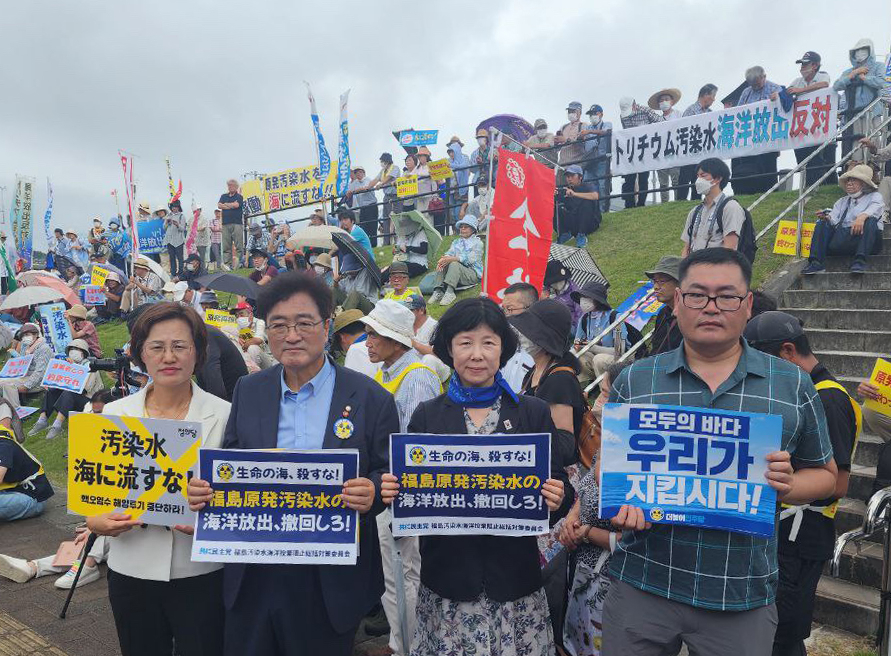Yoon faces mounting protests as Japan releases Fukushima water
By Choi Si-youngPublished : Aug. 27, 2023 - 18:09

South Korean President Yoon Suk Yeol is under increasing pressure over his neutrality regarding Japan's release of wastewater from the damaged Fukushima nuclear plant.
Opposition parties participated in rallies in Fukushima Prefecture on Sunday, calling for an end to potential irreversible harm to health and the environment.
Rep. Woo Won-shik, who heads the main opposition Democratic Party of Korea's campaign against the discharge, labeled the release plans as "criminal," highlighting harm from releasing 1 million metric tons of treated radioactive water into the Pacific Ocean over the next 30 years.
Japan, which started the discharge Thursday, asserts that radiation levels in the water being released into the sea will be sufficiently low, citing a process that filters out and dilutes radioactive elements.
“We will seek all legally available measures for damage Koreans would have to suffer from the release. ... Just yesterday afternoon, about 50,000 South Koreans voiced their opposition,” Woo said at the gathering joined by Korean minor opposition parties, Japan’s opposition parties and environmental groups in Iwaki, a city in Fukushima prefecture. Woo’s party and three other opposition parties had organized similar protests in Seoul.
At the largest anti-government rallies since Thursday's release, Lee Jae-myung, the Democratic Party leader, described the discharge as an "affront to humanity," dubbing it a crime that jeopardizes lives. "It's almost as if Japan has declared war on the Pacific Island nations," Lee added.
According to Lee, Yoon acts as a "facilitator" in aiding the Japanese government to promote its discharge plans, asserting the Korean leader has betrayed his own people. A June poll conducted jointly by the Hankook Ilbo and Yomiuri Shimbun newspapers revealed that 8 in 10 Koreans aged 18 and over oppose the release, while 60 percent of Japanese in the same age bracket support it.
The Yoon administration has neither openly opposed nor publicly supported the release. In July, it stated it "respects the findings" of the International Atomic Energy Agency, the United Nations' nuclear watchdog, which described the radiological impact of the discharge on people and the environment as "negligible."
The stance remains unchanged, said Park Ku-yeon, first deputy chief of the Office for Government Policy Coordination, the body leading interagency efforts to monitor the discharge plans.
“South Korea opposes releases that go against international or scientific standards,” Park told reporters Saturday, without elaborating further. The next day, the Japanese government said radioactive levels around the Fukushima waters were low enough, citing checkups conducted Friday, a day after the discharge.
Choi Eun-mi, a research fellow at the Asan Institute for Policy Studies, said it isn’t up to the Korean government to approve or disapprove of the wastewater release. It is more crucial that Seoul holds Tokyo accountable for its decision, she contends.
“Japan has already made up its mind, and the IAEA has green-lighted it. And the discharge isn’t something that affects South Korea alone; it affects the entire world,” Choi said of voices demanding that Yoon openly challenge the release plans and potentially rally other countries to back him.
Shin Kak-soo, former South Korean ambassador to Japan, said the Yoon administration doesn’t have grounds to do that for now, because “there are currently no indications whatsoever to remotely suggest the release poses health or environment risks.” The former top envoy, who started his two-year stint in May 2011, two months after a tsunami crippled the Fukushima plant, highlighted the importance of looking at “data and numbers.”
“We have to accept them. Otherwise, resisting the discharge will be perceived as politically motivated,” Shin said, adding that Seoul would “definitely have to raise issues with Tokyo when, for example, the figures go off the chart.” Yoon in July asked his Japanese counterpart to share real-time data on the release plans and suspend them if radiation levels exceed safety standards.
On Sunday, a three-member team of South Korean nuclear experts left for the IAEA office in Fukushima, also part of the July proposal. Officials in Seoul said the trip marks the first regular tour of many to come, set to take place every two weeks.




















